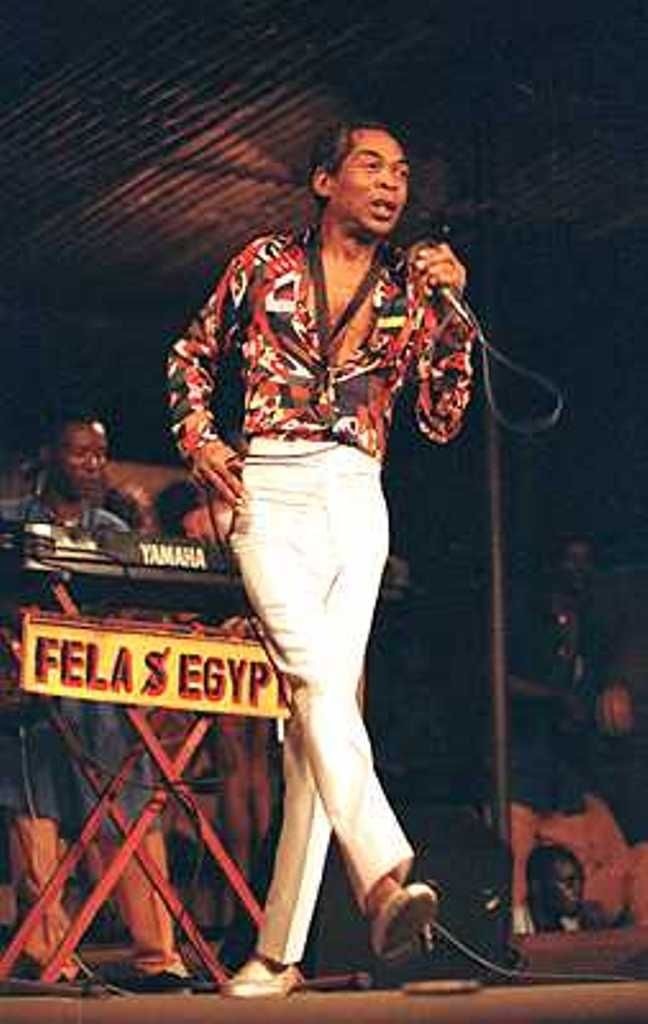Afrobeat is a dynamic music genre that originated in Nigeria in the 1960s and 1970s. It is a combination of jazz, funk, highlife, traditional Yoruba rhythms, and other influences. The legendary musician Fela Kuti, whose impact went well beyond music, was at the vanguard of this movement.
A key player in the history of African music, Fela Anikulapo Kuti was born in Nigeria in 1938. He started his musical career in London studying classical piano and trumpet. However, upon his return to Nigeria, he was greatly inspired by the political and social context of the period, leading him to modify his music to represent these realities.
The intricate rhythms, horn parts, and politically charged lyrics that define Afrobeat are the creation of Fela. He was a strong supporter for Pan-Africanism and a critic of corrupt governments and social injustices through the use of music. His crew, Africa ’70 (later Egypt ’80), was instrumental in creating the Afrobeat genre.

Afrobeat created long, groove-focused compositions by fusing together various genres, including jazz, funk, highlife, and indigenous African rhythms. The mesmerising beats of Fela’s music, which often featured call-and-response vocals, electric guitars, brass sections, and percussion, forced audiences to dance while reflecting on important social themes portrayed in the lyrics.
Beyond music, Fela Kuti was a fearless political activist. His songs, notably “Zombie” and “Coffin for Head of State,” challenged Nigeria’s oppressive regimes, resulting in clashes with authorities and several imprisonments. He founded the Kalakuta Republic, a communal compound that served as a creative hub and a sanctuary for free expression.
Fela Kuti’s influence was international. His unique music, fearless advocacy, and unwavering stand against injustice made an impact on people all over the world. His concerts served as political rallies in addition to being musical events. Fela’s legacy has been cemented by the recognition of artists around the globe, ranging from Paul McCartney to Kendrick Lamar, for his effect on their work.
The popularity of Afrobeat continued after Fela’s death in 1997. The Afrobeat legacy was carried on by his sons Femi and Seun Kuti, who inherited their father’s musical talent and activism. The efforts of Seun Kuti with Egypt ’80 and Femi Kuti with Positive Force demonstrate how Afrobeat is still relevant and evolving in today’s world.
Afrobeat continues to influence music, influencing modern sounds all around the world. Audiences are enthralled by its amalgamation of diverse genres, captivating rhythms, and socially aware motifs. The genre is still relevant today because of its capacity to bring together a wide range of inspirations and tackle important societal concerns.

The socio-political messages expressed in the lyrics of this genre are still very relevant today. The audacious criticism of societal inequities, tyranny by the government, and corruption by Fela Kuti endures. Afrobeat’s themes of resistance, equality, and empowerment continue to resonate with audiences in a time when social justice movements are occurring throughout the world.
Fela Kuti’s legacy as an activist has sustained afrobeat’s relevance. His courage to confront oppressive regimes and demand accountability echoes in today’s movements advocating for human rights, racial equality, and political reform. Artists inspired by Fela’s activism continue to use their platforms to address contemporary issues, carrying forward his spirit of defiance and social consciousness.
Despite its origins, the evolution of afrobeat is still ongoing. Afrobeat components are still used in contemporary music by musicians from Africa and around the world. This progression guarantees the genre’s continued relevance in contemporary music scenes by preserving its vitality and adjusting to new sounds and fashions.
The Afrobeat movement, spearheaded by Fela Kuti, represents more than just a musical genre; it’s a cultural movement that echoes the struggles and aspirations of the African people. Fela’s legacy endures not only through his music but also through his unwavering courage to challenge authority and fight for justice. Afrobeat’s rhythms and messages remain as relevant today as they were during its inception, ensuring Fela Kuti’s influence will continue to inspire generations to come.
Sources
- https://www.britannica.com/biography/Fela-Kuti#:~:text=Fela%20Kuti%2C%20(born%20October%2015,funk%20with%20traditional%20Yoruba%20music.&text=Kuti%20was%20the%20son%20of,labour%20activist%20Funmilayo%20Ransome%2DKuti.
- https://en.m.wikipedia.org/wiki/Fela_Kuti#:~:text=Kuti’s%20musical%20style%20is%20called,to%20James%20Brown’s%20music.
- https://felakuti.com/story
- https://theculturetrip.com/africa/nigeria/articles/fela-kuti-s-afrobeat-legacy




